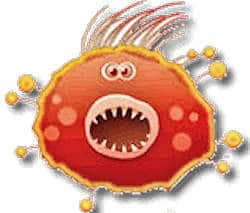SUBJECT: What You Should Know About Canine Parvovirus (CPV)

How is it spread?
CPV-2 is highly contagious and is spread by direct dog-to-dog contact and contact with contaminated feces (stool), environments or people. The virus can also contaminate kennel surfaces, food and water bowls, collars and leashes, and the hands and clothing of people who handle infected dogs. It is resistant to heat, cold, humidity, and drying, and can survive in the environment for long periods of time.
Even trace amounts of feces containing Parvovirus may serve as environmental reservoirs of the virus and infect other dogs that come into the infected environment. CPV-2 is readily transmitted from place to place on the hair or feet of dogs or via contaminated cages, shoes, or other objects.
What dogs are at risk?
All dogs are at risk, but puppies less than four months old and dogs that have not been vaccinated against canine Parvovirus are at increased risk of becoming infected and ill.
What are some facts about Parvovirus?
-
- Parvovirus is very durable in the environment and can persist for months or years.
- ProVetLogic Animal Facility and Ready-To-Use for the Home and Business have been proven to kill Parvovirus when used as directed.
- This virus can spread on hands, feet, clothing, tools, rodents and flies traveling from kennel to kennel. Dogs may carry the virus on their fur and feet even if they themselves do not get ill. The virus enters the dog through the nose or mouth and has an incubation period of 3 days to 2 weeks (usually 5-7 days).
- Puppies under 6 months old are most likely to get severe disease. Rottweilers, Dobermans, Pit Bulls and mixes of these breeds are especially vulnerable. Adult dogs may get mild disease that is indistinguishable from diarrhea of any other cause. Affected dogs have mild to severe diarrhea, may be dehydrated and lethargic, have vomiting, or can develop severe to fatal secondary bacterial infections.
- Vaccination usually prevents disease in adult dogs that have received a vaccine at least 1-2 weeks before exposure, but does not prevent them from carrying virus on fur if exposed. Puppies up to 16 weeks of age may not be protected fully by vaccination.
How is Canine-Parvovirus prevented?
Vaccination and good hygiene are critical components of canine Parvovirus prevention.
You may wish to view our page on how to kill Parvovirus.
Here is what AVMA said about Parvovirus.
Canine Parvovirus is a highly contagious viral infection that affects dogs, especially puppies. It can lead to severe gastrointestinal symptoms and can be fatal if not treated promptly. In recent years, there has been a significant increase in the relevance of this virus due to its widespread presence and outbreaks in various regions.
It primarily spreads through direct contact with infected dogs or contaminated objects, such as food bowls, toys, or kennel surfaces. The virus can survive in the environment for extended periods, making it challenging to eradicate.
Infected dogs may display symptoms such as vomiting, diarrhea (often bloody), lethargy, loss of appetite, and dehydration. The severity of the illness can vary, with puppies and unvaccinated dogs being particularly vulnerable.
Prompt diagnosis and treatment are crucial for the management of parvovirus. Veterinarians typically perform a physical examination, along with laboratory tests, to confirm the presence of the virus. Treatment may involve supportive care, including intravenous fluids, medications to control vomiting and diarrhea, and antibiotics to prevent secondary infections.
Prevention is key in controlling the spread of this virus. Vaccination plays a significant role in protecting dogs from this highly contagious disease. Puppies should receive a series of vaccines starting at 6-8 weeks of age, followed by boosters to ensure long-lasting immunity. It is also important to practice good hygiene, such as regularly cleaning and disinfecting common areas where dogs gather.
In recent years, there have been reports of outbreaks in various communities, raising awareness about the importance of vaccination and preventive measures. It is crucial for dog owners to stay informed about the prevalence of parvovirus in their area and take appropriate steps to protect their pets.

